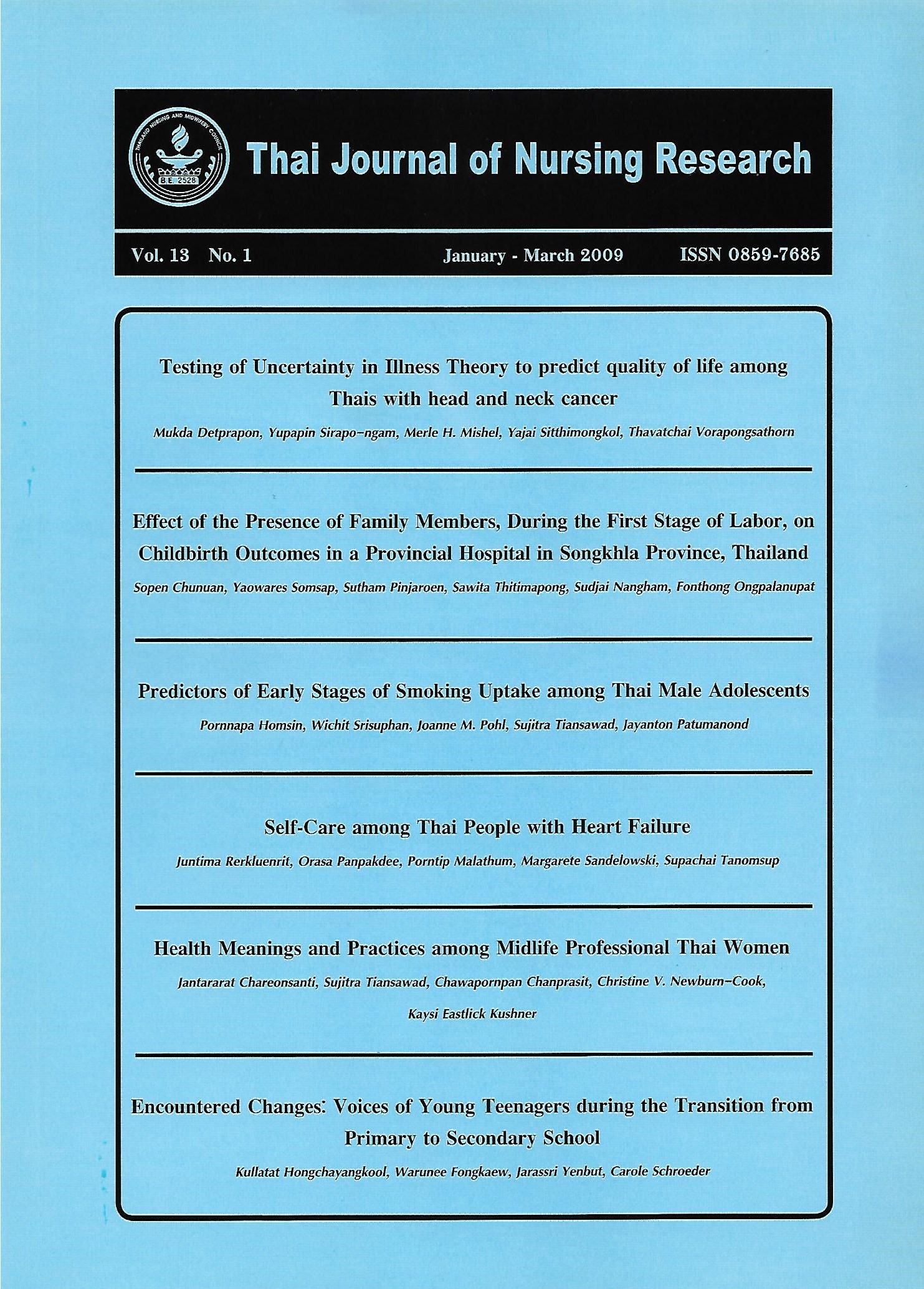Effect of the Presence of Family Members , During the First Stage of Labor , on Childbirth Outcomes in a Provincial Hospital in Songkhla Province , Thailand
Keywords:
การมีญาติเฝ้าในระยะคลอด, แรงสนับสนุนด้านจิตใจ, ผลลัพธ์การคลอด, ประเทศไทย, relative’s presence during intrapartum, emotional support, childbirth outcomes, ThailandAbstract
บทคัดย่อ
โรงพยาบาลของรัฐบาลในประเทศไทยส่วนใหญ่ไม่อนุญาตให้ญาติของหญิงตั้งครรภ์เฝ้าคลอด ทำให้หญิงระยะคลอดต้องเผชิญกับสิ่งแวดล้อมที่ไม่คุ้นเคยท่ามกลางคนแปลกหน้าโดยลำพัง วัตถุประสงค์ของการศึกษาครั้งนี้เพื่อเปรียบเทียบระดับความวิตกกังวล ความเจ็บปวดในระยะคลอด ความพึงพอใจต่อประสบการณ์การคลอด ระยะที่ 1 ของการคลอด ชนิดของการคลอด การใช้ยาระงับปวด Pethidine และค่าคะแนน Agpar ของทารกนาทีที่ 1 และ 5 ระหว่างกลุ่มทดลอง ที่มีญาติเฝ้าคลอดในระยะที่ 1 ของการคลอดกับกลุ่มควบคุมที่ไม่มีญาติเฝ้าคลอดในจังหวัดสงขลา การศึกษากึ่งทดลองนี้มีกลุ่มตัวอย่างเป็นหญิงตั้งครรภ์ 114 คน (กลุ่มทดลอง 56 คน และกลุ่ม ควบคุม 58 คน) เครื่องมือวิจัยประกอบด้วย แบบสอบถาม 4 ชุด และแบบวัดระดับความปวด เครื่องมือวิจัยได้ผ่านการตรวจสอบความตรงโดยผู้เชี่ยวชาญ 5 ท่าน หลังจากนั้นนำไปทดลอง เก็บข้อมูลกับหญิงหลังคลอดจำนวน 20 คนเพื่อหาความเที่ยงและความเหมาะสมของเครื่องมือ วิเคราะหข้อมูลโดยใช้สถิติบรรยายและสถิติอ้างอิง ผลการศึกษาพบว่าคะแนนความวิตกกังวล ของกลุ่มทดลองและกลุ่ทควบคุมมีความแตกต่างกันอย่างมีนัยสำคัญทางสถิติ ส่วนตัวแปรอื่นๆ มีค่าแตกต่างกันอย่างไม่มีนัยสำคัญทางสถิติ อย่างไรก็ตามผลของการศึกษาครั้งนี้ไม่สามารถ สนับสนุนผลของการมีญาติเฝ้าต่อผลลัพธ์ของการคลอดอื่นๆ
คำสำคัญ: การมีญาติเฝ้าในระยะคลอด แรงสนับสนุนด้านจิตใจ ผลลัพธ์การคลอด ประเทศไทย
Abstract
Thailand, most public hospitals do not allow family members of pregnant women to be present during intrapartum. Thus, women, during labor and delivery, have to face childbirth in an unfamiliar environment surrounded only by strangers. The purpose of this study, in Songkla Province, was to compare between women, who had a relative present during the first stage of intrapartum and those who did not, anxiety levels, labor pain, satisfaction with the childbirth experience, duration of the first stage of labor, type of delivery, use of Pethidine and the babies’ Apgar scores at 1 and 5 minutes. A quasi-experimental design was implemented using 114 pregnant women (experimental group ท = 56; control group ท = 58). Four questionnaires and a visual analog scale were used for data collection. Content validity of each questionnaire was judged by five experts in intrapartum care. To assure reliability of the questionnaires and feasibility of the research procedure, a pilot study was conducted using the questionnaires with 20 postpartum women. Data analyses were accomplished using both descriptive and inferential statistics. The findings revealed a significant difference in anxiety scores between the experimental and control groups. No other significant differences were found. The results suggest having a relative present, during intrapartum, reduces a women’s anxiety. However, the findings did not support the positive effect of having a relative present during intrapartum, regarding other childbirth outcomes.
Keywords: relative’s presence during intrapartum, emotional support, childbirth outcomes, Thailand
Downloads
How to Cite
Issue
Section
License
Copyright: The Pacific Rim International Journal of Nursing Research, Thailand Nursing & Midwifery Council has exclusive rights to publish, reproduce and distribute the manuscript and all contents therein.








.png)



